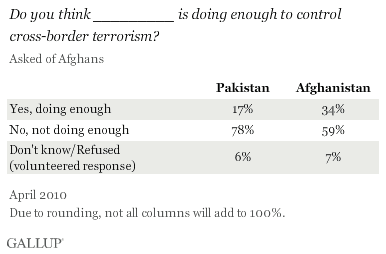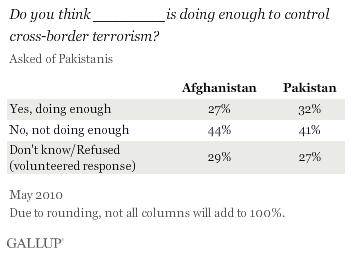WASHINGTON, D.C. -- After last month's leak of U.S. intelligence documents related to the war in Afghanistan suggested Pakistani collusion with the Taliban, Afghan President Hamid Karzai criticized the West, as well as Pakistan, for not doing enough to counter cross-border terrorist threats from within Pakistan. Gallup surveys conducted before the leak found 78% of Afghans would agree Pakistan's efforts fall short.

A majority of Afghans (59%) also feel this way about their own country's efforts to control cross-border terrorism. Understandably, those closest to the Afghanistan-Pakistan border are the most critical of each country's efforts. More than 90% of Afghans living in the East say both countries are not doing enough.
Across the border in Pakistan, 44% of adults say Afghanistan isn't doing enough to control cross-border terrorism. A similar percentage of Pakistanis (41%) say their own country's efforts fall short.

Pakistanis, even those living closer to the border regions, are less decided than Afghans on this issue. Nearly 3 in 10 Pakistani adults (29%) volunteer they "don't know" whether Afghanistan's cross-border anti-terrorism efforts are sufficient.
About half of Pakistanis living in Baluchistan (47%), Khyber Pakhtunkhwa (formerly North West Frontier Province; 46%), which border the volatile tribal regions, and Punjab (52%), which borders the Kashmir region, say their country isn't doing enough. More than 4 in 10 in these three provinces also say the same about Afghanistan's efforts.
Implications
Even before the recent intelligence leaks, Gallup surveys showed neither Afghans nor Pakistanis placed much faith in each other's efforts to control cross-border terrorism nor their own respective country's efforts. The situation is likely even more fragile now, but leaders may do better to focus on improving perceptions of their own country's efforts before pointing a finger at the other.
For complete data sets or custom research from the more than 150 countries Gallup continually surveys, please contact SocialandEconomicAnalysis@gallup.com or call 202.715.3030.
Survey Methods
Results are based on face-to-face interviews with 1,000 adults, aged 15 and older, conducted in April 2010 in Afghanistan. For results based on the total sample of national adults, one can say with 95% confidence that the maximum margin of sampling error is ±4.1 percentage points. Gender-matched sampling was used during the final stage of selection.
Results are based on face-to-face interviews with 1,000 adults, aged 15 and older, conducted in May 2010 in Pakistan. For results based on the total sample of national adults, one can say with 95% confidence that the maximum margin of sampling error is ±3.7 percentage points. FATA/FANA were excluded. The excluded area represents less than 5% of the population. Gender-matched sampling was used during the final stage of selection.
The margin of error reflects the influence of data weighting. In addition to sampling error, question wording and practical difficulties in conducting surveys can introduce error or bias into the findings of public opinion polls.
